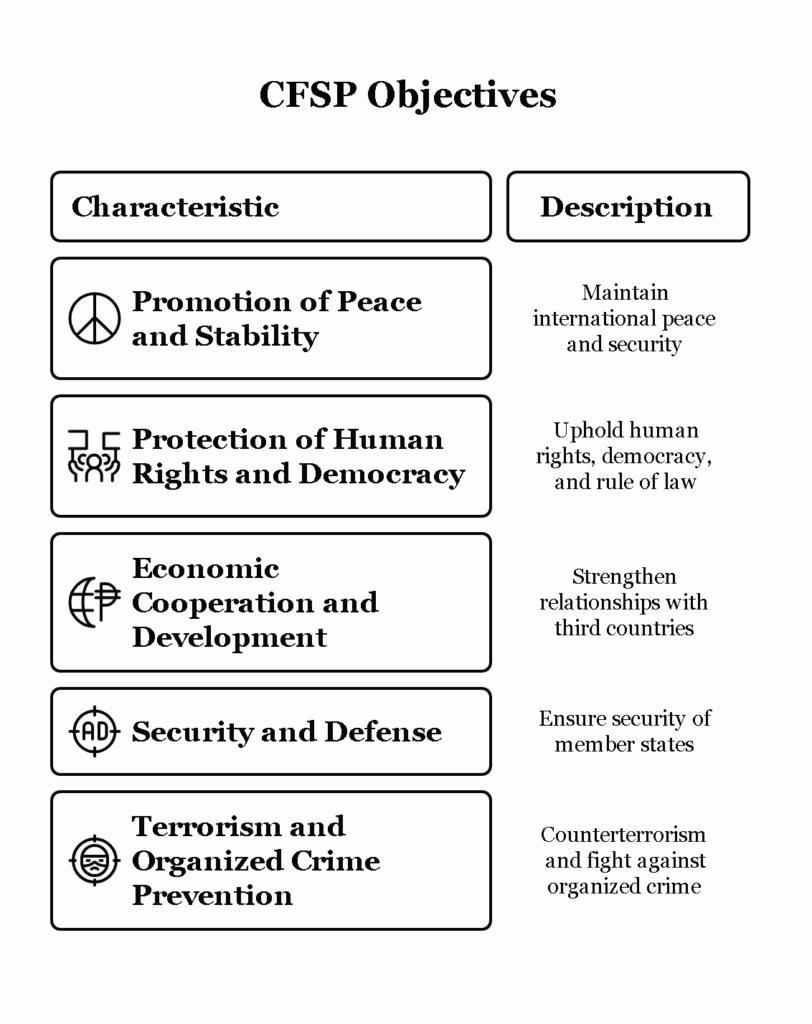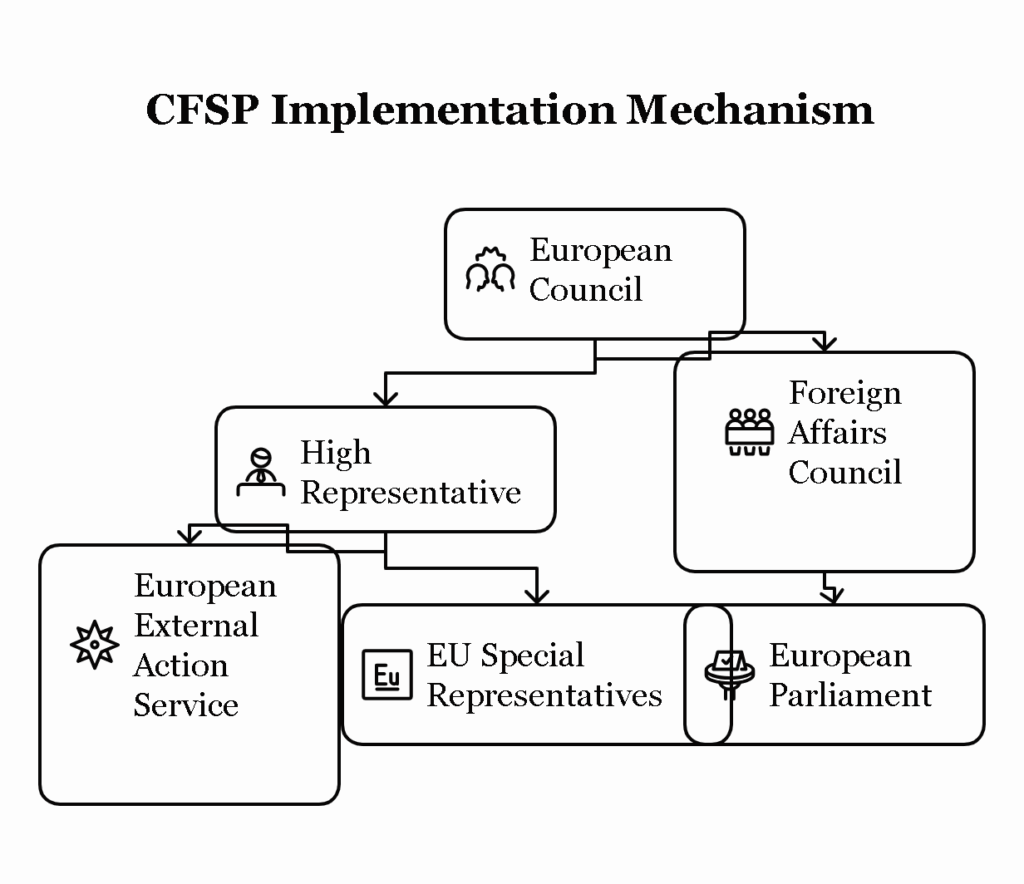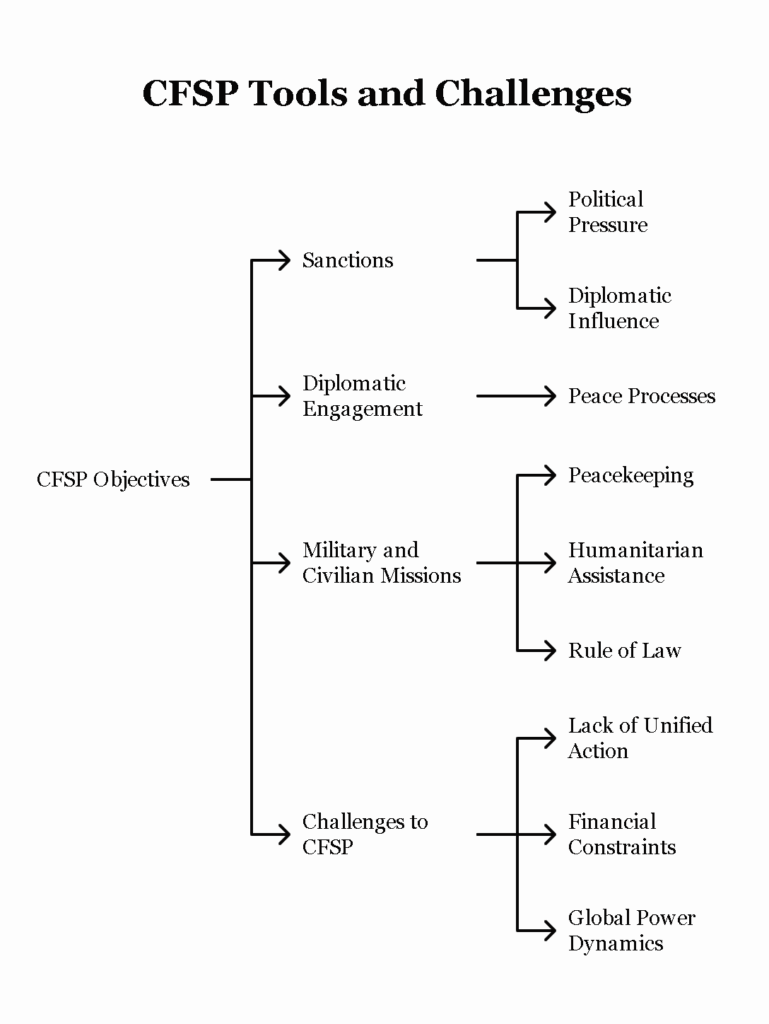The Common Foreign and Security Policy (CFSP) is a critical component of the European Union’s (EU) external action framework. It aims to promote the EU’s interests and values in the global arena through a coordinated approach to foreign policy and security matters. The CFSP is based on the idea that the EU, as a collective actor, should have a unified voice in global affairs to ensure peace, stability, and prosperity for its member states and beyond. This policy not only focuses on diplomatic and political relations but also integrates security and defense concerns, particularly through the Common Security and Defence Policy (CSDP).
1. Objectives of the CFSP
The CFSP’s objectives are aligned with the EU’s broader goals of promoting peace, democracy, human rights, stability, and prosperity. These objectives include:
- Promotion of Peace and Stability:
A core objective of the CFSP is to maintain international peace and security. The EU aims to contribute to conflict prevention, peacebuilding, and the resolution of crises around the world. This is achieved through diplomatic means, peacekeeping missions, and supporting multilateral organizations like the United Nations (UN). For instance, the EU has played an active role in peacekeeping missions in places such as Bosnia and Herzegovina and the Democratic Republic of Congo. - Protection of Human Rights and Democracy:
The EU seeks to uphold human rights, democracy, and the rule of law as fundamental principles of its external policy. The CFSP works to promote these values by supporting human rights defenders, encouraging democratic reforms, and providing assistance to countries transitioning from authoritarian regimes to democratic governance. The EU also uses its political influence to hold countries accountable for human rights violations, often linking these concerns to trade agreements and financial assistance. - Economic Cooperation and Development:
The CFSP aims to strengthen the EU’s relationships with third countries and regions, focusing on creating stable, cooperative, and mutually beneficial economic partnerships. By promoting development, good governance, and integration into the global economy, the EU helps developing countries achieve sustainable growth. This includes supporting trade liberalization, the reduction of poverty, and climate change mitigation in countries around the world. - Security and Defense:
The EU’s CFSP is also concerned with ensuring the security of its member states and the broader international community. This is closely tied to the Common Security and Defence Policy (CSDP), which provides the EU with a framework for military and civilian interventions in crisis situations. The EU aims to contribute to global security through peacekeeping, counterterrorism efforts, and maintaining stability in conflict-prone regions. - Terrorism and Organized Crime Prevention:
Counterterrorism and the fight against organized crime, human trafficking, and nuclear proliferation are also key objectives of the CFSP. The EU coordinates with other international actors to prevent the spread of terrorism, enhance border security, and combat illegal arms trade and trafficking networks.

2. Mechanism of CFSP
The implementation of the CFSP is coordinated through various EU institutions, each of which plays a specific role in shaping and executing foreign policy decisions. The key components of the CFSP mechanism are as follows:
- European Council:
The European Council, comprising the heads of state or government of EU member states, is the main body responsible for defining the strategic direction of the CFSP. It sets the overall policy guidelines and decisions for foreign and security matters. While the European Council does not directly conduct day-to-day foreign policy activities, its decisions shape the EU’s priorities and objectives. - High Representative of the Union for Foreign Affairs and Security Policy:
The High Representative (HR) plays a central role in the CFSP, serving as both the EU’s chief diplomat and the Vice-President of the European Commission. The HR is responsible for coordinating foreign policy actions, representing the EU in international organizations (such as the UN and the World Trade Organization), and leading the European External Action Service (EEAS), the EU’s diplomatic arm. The HR works to ensure that the EU speaks with one voice in global affairs and that the EU’s external actions are consistent with its core values. - European External Action Service (EEAS):
The EEAS is the EU’s diplomatic corps, established to support the High Representative and the implementation of the CFSP. It is composed of diplomats from EU member states and EU institutions, and its mission is to provide the technical and analytical expertise necessary to implement EU foreign and security policy decisions. The EEAS manages the EU’s missions abroad, including delegations to third countries and international organizations. - Council of the European Union (Foreign Affairs Council):
The Foreign Affairs Council is composed of the foreign ministers of EU member states and is responsible for making decisions on the CFSP. It is the main decision-making body for foreign policy and security matters, and it is responsible for approving or amending the strategic guidelines set by the European Council. The Council’s decisions are often based on consensus, and it has the authority to impose sanctions, approve military interventions, and coordinate peacekeeping efforts. - European Parliament:
The European Parliament has a more limited role in the CFSP, but it provides democratic oversight and accountability. Parliament can influence foreign policy decisions through debates, resolutions, and recommendations. It also participates in approving budgetary allocations for the EU’s foreign policy and development actions. Parliament can also scrutinize the High Representative’s actions and advise on the EU’s overall strategy. - EU Special Representatives (EUSRs):
The EU appoints Special Representatives to certain regions or issues where the EU has a strategic interest. EUSRs represent the EU’s position on specific policy matters, such as conflict resolution or post-conflict reconstruction, in regions like the Middle East, Africa, and the Balkans. They coordinate diplomatic efforts and liaise with local governments and international organizations.

3. Key Tools and Instruments of CFSP
The CFSP uses several tools to achieve its objectives, including:
- Sanctions:
One of the primary tools of the CFSP is the imposition of sanctions against countries or entities that violate international law, commit human rights abuses, or pose a threat to international peace. The EU’s sanctions include travel bans, asset freezes, arms embargoes, and trade restrictions. Sanctions are a way for the EU to exert political pressure and diplomatic influence without resorting to military intervention. - Diplomatic Engagement and Mediation:
The EU frequently engages in diplomatic dialogues with other countries and international organizations to promote peace and stability. It has been active in mediation efforts in regions such as the Middle East and Ukraine. The EU also facilitates peace processes, including negotiations and peace agreements between conflicting parties. - Military and Civilian Missions:
The EU carries out both military and civilian missions as part of the CSDP. These missions range from peacekeeping and humanitarian assistance to conflict prevention and crisis management. Military operations may involve the deployment of EU forces to enforce peace or provide security in conflict zones. Civilian missions may focus on police training, border management, and rule of law initiatives in post-conflict areas.
4. Challenges to CFSP
Despite its objectives and mechanisms, the CFSP faces several challenges:
- Lack of Unified Action:
A key challenge to the CFSP is the difficulty in achieving consensus among EU member states, each of which has its own foreign policy priorities. Divergences in national interests, historical relationships, and geopolitical considerations often hinder the EU from speaking with one voice or taking unified action. - Financial Constraints:
The EU’s ability to execute foreign and security policy initiatives is often constrained by financial limitations. Military missions, development aid, and diplomatic engagement require significant resources, and EU member states sometimes fail to commit sufficient funding for these activities. - Global Power Dynamics:
The geopolitical environment has become more complex, with rising powers such as China and Russia challenging the EU’s influence. The CFSP must navigate a landscape where global power dynamics are shifting, and the EU faces competition from other international actors in areas like trade, security, and diplomacy.

Conclusion
The Common Foreign and Security Policy (CFSP) is an essential element of the European Union’s external relations. It aims to promote peace, stability, and human rights while securing the EU’s interests in the global arena. Despite its institutional mechanisms and strategic goals, the CFSP faces challenges in achieving unified action due to varying national interests, financial constraints, and shifting global power dynamics. However, it remains a key instrument for the EU’s role as a global actor, enabling it to address international challenges and contribute to the promotion of a more peaceful and prosperous world.








Leave a Reply